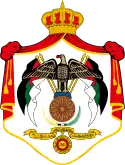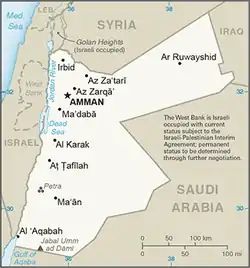Jordan
Jordan (officially the Hashemite Kingdom of Jordan) is an Arab country in southwest Asia, in the Middle East, in the southern part of the Levant region, and the northern part of the Arabian Peninsula. Jordan has borders with Syria to the north, Palestine and Israel to the west, Iraq to the east, Saudi Arabia to the east and south, and the Gulf of Aqaba to the southwest, where the city of Aqaba is next to the Red Sea.
Hashemite Kingdom of Jordan | |
|---|---|
 Coat of arms
| |
| Motto: "God, Country, King" الله، الوطن ، الملك" "Allah, Al-Waṭan, Al-Malik"[1] | |
| Anthem: "The Royal Anthem of Jordan" السلام الملكي الأردني Al-Salam Al-Malaki Al-Urdunni | |
.svg.png.webp) | |
_-_JOR_-_UNOCHA.svg.png.webp) | |
| Capital and largest city | Amman 31°57′N 35°56′E |
| Official languages | Arabic |
| Ethnic groups | |
| Religion |
|
| Demonym(s) | Jordanian |
| Government | Unitary parliamentary constitutional monarchy |
• Monarch | Abdullah II |
| Bisher Al-Khasawneh | |
| Legislature | Parliament |
| Senate | |
| House of Representatives | |
| Independence from the United Kingdom mandate | |
• Emirate | 11 April 1921 |
| 25 May 1946 | |
• Constitution | 11 January 1952 |
| Area | |
• Total | 89,341 km2 (34,495 sq mi) (110th) |
• Water (%) | 0.6 |
| Population | |
• 2017 estimate | 10,011,820[2] (90th) |
• 2015 census | 9,531,712 |
• Density | 107/km2 (277.1/sq mi) (100th) |
| GDP (PPP) | 2016 estimate |
• Total | $86.193 billion[3] (87th) |
• Per capita | $11,124[3] (86th) |
| GDP (nominal) | 2016 estimate |
• Total | $39.453 billion[3] (92nd) |
• Per capita | $5,092[3] (95th) |
| Gini (2011) | 35.4[4] medium |
| HDI (2014) | high · 80th |
| Currency | Jordanian dinar (JOD) |
| Time zone | UTC+2 (EET) |
| UTC+3 (EEST) | |
| Driving side | right |
| Calling code | +962 |
| ISO 3166 code | JO |
| Internet TLD | .jo .الاردن |
Website jordan.gov.jo | |

The capital of Jordan is Amman. Aqaba is the only sea port for Jordan with only 27 kilometers of coastline. Jordan is named after Jordan River, which passes on its western borders. Jordan is a country that combines different Arab cultures and dialects, and no natural borders separate it from its Arab neighbors except the Jordan River which separates Jordan and Palestine as well as the Yarmouk River, which separates Jordan and Syria. As for the rest of the borders, it is an extension of the Levant Badia in the north and east, the Influence Desert in the south, and Wadi Araba to the southwest.
The terrain in Jordan varies greatly, the most important of which are the Ajloun Mountains in the northwest, and the Shara Mountains in the south, the highest peak on Umm al-Dami Mountain is 1854 meters, and the lowest point in the Dead Sea, which is the lowest point in the world.
In 1921, Prince Abdullah bin Al-Hussein established the Emirate of Transjordan with the help of Britain, and it was then subject to British rule in the Mandatory region of Palestine. The system in the Hashemite Kingdom of Jordan is a constitutional monarchy with a representative government. The king exercises his executive power through the Prime Minister and the Council of Ministers, who, at the same time, are accountable to the House of Representatives (elected) and the Senate (appointed by the king) who are the legislative branch of the state. There is also an independent judiciary system.
Jordan is a founding member of the League of Arab States and the Organization of Islamic Cooperation. Jordan is a sovereign constitutional monarchy, yet the king enjoys extensive executive and legislative powers.
Jordan is frequently referred to as an "oasis of stability" in a turbulent region, given that it was mostly unaffected by the violence that engulfed the region in 2010. However, the country's population suffers from relatively high rates of unemployment and poverty.
Governorates
Jordan is divided into 12 Governorates. The governorates are divided into 54 departments or districts named Nahias.
|
|
Culture
People from Jordan are called Jordanians. Most of them speak Arabic as their first language. The population of Jordan is about 10.5 million people.
Jordan is a constitutional monarchy and has a king. The King is the head of state, but he does not have all the power in the country. King Abdullah II has been the King of Jordan since February 1999. Most Jordanians are Muslim. There are around 200-400,000 Christians.
Jordan's national meal is mansaf. The most popular sport is football.
Economy
Unlike some of the countries around it, Jordan has little petroleum and natural gas. Some of its economy comes from mining instead. Jordan is the largest producer of the mineral phosphate in the world.[6] Jordan is a Member of the OECD since 2019 as the first Arab Country to do so.
The currency of Jordan is called the Jordanian dinar.
Related pages
References
- Temperman, Jeroen (2010). State-Religion Relationships and Human Rights Law: Towards a Right to Religiously Neutral Governance. Brill. p. 87. ISBN 978-90-04-18148-9. Retrieved 20 March 2016.
- "Population clock". Department of Statistics. Archived from the original on 19 October 2017. Retrieved 14 November 2017.
- "Jordan". International Monetary Fund.
- "Gini index". World Bank. Retrieved 14 June 2016.
- "2015 Human Development Report Summary" (PDF). United Nations Development Programme. 1 January 2015. pp. 21–25. Retrieved 6 June 2016.
- Economic Impact on the U.S. of a U.S.-Jordan Free Trade Agreement, Inv. 332-418. DIANE Publishing. ISBN 978-1-4578-2335-0.
Gallery
 Gold district in Amman
Gold district in Amman Citadel in Amman
Citadel in Amman Umayyad Qasr in Amman
Umayyad Qasr in Amman Great Temple in Petra
Great Temple in Petra Nymphaeum in Jerash
Nymphaeum in Jerash Oval Forum in Jerash
Oval Forum in Jerash
